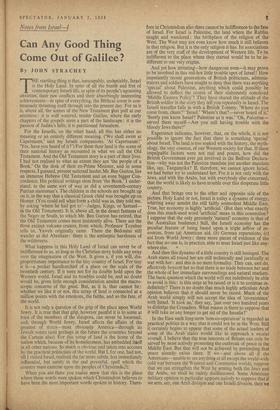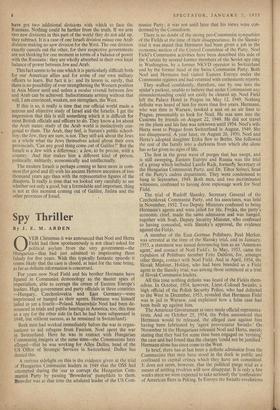Notes . from Israel—I
Can Any Good Thing Come Out of Galilee?
By JOHN STRACHEY THE startling thing is that, inescapably, undeniably, Israel is the Holy Land. In spite of all the bustle and fret of contemporary Israeli life, in spite of its people's agonising anxieties: their raw conflicts and their absorbingly interesting achievements—in spite of everything, the Biblical scene is con- tinuously thrusting itself through into the present day. For us it is, above all, the scenes of the-New Testament that pull at our attention : it is well watered, tender Galilee, where the early chapters of the gospels seem a part of the landscape : it is the passion of Judwa's hills; it is partitioned Jerusalem. , For the Israelis, on the other hand, all this has either no meaning or an entirely different meaning. ('We shall swim at Capernaum,' said my Israeli companions. 'At Capernaum I' `Yes, have you heard of it?') For them their land is the scene of their national history as recounted in what we call the Old Testament. And the Old Testament story is a part of their lives. I had not realised to what an extent they are 'the people of a Book.' On the desk of their ex-Prime Minister, and in some respects, I guessed, present national leader,Mr. Ben Gurion, lies an immense Hebrew Old Testament and an even bigger Con- cordance. His political writings stem from 'the Book,' I under- stand, in the same sort of way as did a seventeenth-century Puritan statesman's. The children in the schools are brought up on it, in the way that a classical Greek child was brought up on Homer. (You could tell what form a child was in, they told me, by asking 'where he had got to'—Judges, Kings, or Samuel— in the Old Testament). It is; above all, in the desert fastness of the Negev or South, to which Mr. Ben Gurion has retired, that the Old Testament comes most insistently alive. There are the three extinct volcano craters, from which, Professor Toynbee tells us, Yaweh originally came. There the Bedouins still wander as did Abraham : there is the antiseptic harshness of the wilderness.
What happens in this Holy Land of Israel can never be of indifference to us, so long as the Christian story holds any sway over the imagination of the West. It gives a, if you will, dis- proportionate importance to the tiny country of Israel. For tiny it is—a pocket handkerchief of a place on the scale of the twentieth century. If it were not for its double hold upon the Western world, Israel and its troubles could be, and no doubt would be, given little enough consideration amidst the macro- scopic concerns of the great. But, as it is, that cannot be: whether we like it or not, this scrap of land is connected at a million points with the emotions, the faiths, and so the fate, of the world.
It is not only a question of the grip of the place upon World Jewry. It is true that that grip, however painful it is to some at least of the members of the diaspora, can never be loosened; and, through World Jewry, Israel affects the affairs of the greatest of states—most obviously America—through its Jewish voters (and perhaps in the future the countries beyond the Curtain also). For this scrap of land is the home of the nation which, because of its homelessness, has embedded itself in all other nations. So much is obvious and taken into account by the practical politicians of the world. But I, for one, had not, till 1 visited Israel, realised the far more subtle, less immediately influential, but surely in the end powerful, spell which the country must exercise upon the peoples of Christendort.
When you are there you realise anew that this is the place where those words were spoken which Christendom believes to have been the most important words spoken in history. There- fore in Christendom also there cannot be indifference to the fate of Israel. For Israel is Palestine, the land where the Rabbis taught and wandered : the birthplace of the religion of the West. The West may not even know how much it still believes in that religion. But it is the only religion it has. Its associations are of the very stuff of the development of Western life. To be indifferent to the place where they started would be to be in- different to our very origins.
And yet how irritating—how dangerous even—it may prove to be involved in this red-hot little trouble spot of Israel! How impatiently recent generations of British politicians, adminis- trators and soldiers have sought to deny that there was anything `special' about Palestine, anything which could possibly be allowed to deflect the course of their elaborately conceived `Middle Eastern Policy'! They have shared the attitude of the British soldier in the story they tell you repeatedly in Israel. The Israeli traveller falls in with a British Tommy. 'Where do you come from, chum?' Israel."Where's that?—never beard of it.' `Surely you know Israel? Palestine as it was."Oh, Palestine— served there myself—Are you still having trouble with the bloody Jews there?'
Experience indicates, however, that, on the whole, it is not possible to ignore the fact that there is something 'special' about Israel. The land is too soaked with the history, the myth- ology, the very essence, of our Western society for that. If these impalpable factors were not real and potent, how did the British Government ever get involved in the Balfour Declara- tion—why was not the Palestine mandate just another mandate like, say, Tanganyika? If, therefore, we cannot ignore Israel, we had better try to understand her. For it is not only with the Jews, and with the Arabs, but with everybody else concerned, that the world is likely to have trouble over this desperate little country.
And that brings one to the other and opposite side of the picture. Holy Land or not, Israel is today a dynamo of energy, whirring away amidst the still fairly somnolent Middle East. True, her economy is highly 'artificial.' (But then what exactly does this much-used word 'artificial' mean in this connection? I suppose that the only genuinely 'natural' economy is that of the Australian bushmen.) Still, the Israeli economy has the peculiar feature of being based upon a triple inflow of re- sources, from (a) American aid, (b) German reparations, (c) aid from World Jewry : three more pieces of evidence of the fact that no one is, in practice, able to treat Israel just like any- where else. s And then this dynamo of a little country is still besieged. The Arab states all round her are still technically and juridically at war with her : and this is no mere formality. They can, and do, effectively boycott her so that there is no trade between her and the whole of her immediate surroundings and natural markets. The basic question which the world will not indefinitely be able to avoid is this : is this siege to be raised or is it to continue in- definitely? There is no doubt that much highly articulate Arab opinion believes that it should never be raised. Much of the Arab world simply will not accept the idea of 'co-existence' with Israel. `It took us,' they say, 'just over two hundred years to dislodge the Crusaders. What reason is there to suppose that it will take us any longer to get rid of the Israelis?'
In the East such lo,ng-term 'non-co-operation' is regarded as practical politics in a way that it could not be in the West. Still it certainly begins to appear that some of the actual leaders of some of the Arab states would like to approach a modus vivendi. I believe that the true interests of Britain can only be served by most actively promoting the outbreak of peace in the Middle East. But that will not be achieved by pretending that peace already exists there. If we—and above all if the Americans—unable to see anything at all except the world-wide cold war between the Western and Communist worlds, suppose that we can strengthen the West by arming both the Jews and the Arabs, we shall be rudely disillusioned. Some American military opinion in particular appears naively to suppose that if we arm, say, one Arab division and one Israeli division, then we have got two additional divisions, with which to face the Russians. Nothing could be farther from the truth. If we arm two new divisions in this part of the world they do not add up, they subtract. It is a case of one Israeli division minus one Arab division making no new division for the West. The one division exactly cancels out the other, for their respective governments are not thinking for one moment in terms of a balance of power with the Russians : they are wholly absorbed in their own local balance of power between Jew and Arab.
This fact seems to be one which it is particularly difficult both for our American allies and for some of our own military officers to learn. But fact it is : and its lesson is, surely, that there is no possibility of ever strengthening the Western position in Asia Minor until and unless a modus vivendi between Jew and Arab can be achieved. Indiscriminate arming without that will, I am convinced, weaken, not strengthen, the West.
If this is so, it really is time that our official world made a serious and objective study of Israel and the Israelis. I get the impression that this is still something which it is difficult for most British officials and officers to do. They know a lot about the Arab states; study of the Arab world is instinctively con- * genial to them. The Arab, they feel, is Nature's public school- boy; the Jew, they are sure, is not. They still ask about the Jews as a- whole what the Jews themselves asked about their own provincials, 'Can any good thing come out of Galilee?' But the Israeli is a Jew with a difference : a Jew, to be precise, with a country. And that makes him a different kind of person, politically, militarily, economically and intellectually.
The modern Israeli is perhaps coming to have more in com- mon (for good and ill) with his ancient Hebrew ancestors of two thousand years ago than with the representative figures of the diaspora. It really is time that we looked very carefully to see whether not only a good, but a formidable and important, thing is not at this moment coming out of Galilee, Judaea and the other provinces of Israel.















































 Previous page
Previous page